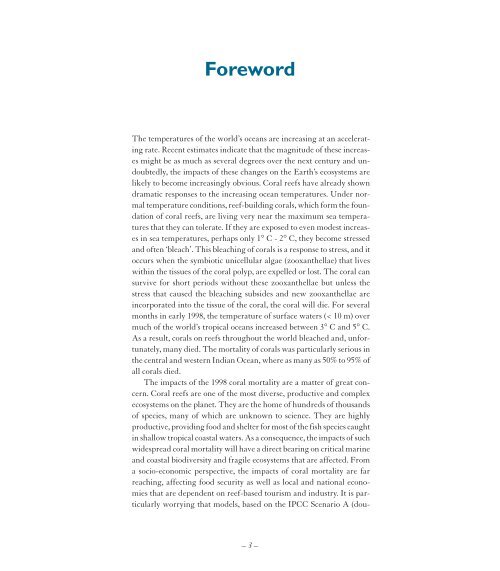Create successful ePaper yourself
Turn your PDF publications into a flip-book with our unique Google optimized e-Paper software.
Foreword<br />
The temperatures of the world’s oceans are increasing at an accelerating<br />
rate. Recent estimates indicate that the magnitude of these increases<br />
might be as much as several degrees over the next century and undoubtedly,<br />
the impacts of these changes on the Earth’s ecosystems are<br />
likely to become increasingly obvious. Coral reefs have already shown<br />
dramatic responses to the increasing ocean temperatures. Under normal<br />
temperature conditions, reef-building corals, which form the foundation<br />
of coral reefs, are living very near the maximum sea temperatures<br />
that they can tolerate. If they are exposed to even modest increases<br />
in sea temperatures, perhaps only 1° C - 2° C, they become stressed<br />
and often ‘bleach’. This bleaching of corals is a response to stress, and it<br />
occurs when the symbiotic unicellular algae (zooxanthellae) that lives<br />
within the tissues of the coral polyp, are expelled or lost. The coral can<br />
survive for short periods without these zooxanthellae but unless the<br />
stress that caused the bleaching subsides and new zooxanthellae are<br />
incorporated into the tissue of the coral, the coral will die. For several<br />
months in early 1998, the temperature of surface waters (< 10 m) over<br />
much of the world’s tropical oceans increased between 3° C and 5° C.<br />
As a result, corals on reefs throughout the world bleached and, unfortunately,<br />
many died. The mortality of corals was particularly serious in<br />
the central and western Indian Ocean, where as many as 50% to 95% of<br />
all corals died.<br />
The impacts of the 1998 coral mortality are a matter of great concern.<br />
Coral reefs are one of the most diverse, productive and complex<br />
ecosystems on the planet. They are the home of hundreds of thousands<br />
of species, many of which are unknown to science. They are highly<br />
productive, providing food and shelter for most of the fish species caught<br />
in shallow tropical coastal waters. As a consequence, the impacts of such<br />
widespread coral mortality will have a direct bearing on critical marine<br />
and coastal biodiversity and fragile ecosystems that are affected. From<br />
a socio-economic perspective, the impacts of coral mortality are far<br />
reaching, affecting food security as well as local and national economies<br />
that are dependent on reef-based tourism and industry. It is particularly<br />
worrying that models, based on the IPCC Scenario A (dou-<br />
– 3 –


















